
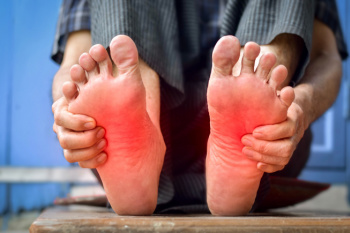
Foot pain can be a sign of arthritis, a condition that affects the joints and causes inflammation, stiffness, and discomfort. Several types of arthritis can affect the feet, including osteoarthritis, rheumatoid arthritis, and gout. Osteoarthritis is the most common type of arthritis, often linked to wear and tear in the joints over time. Rheumatoid arthritis is an autoimmune condition that affects multiple joints, usually starting in smaller joints like those in the feet. Gout typically targets the big toe with sudden, intense pain. Symptoms of arthritis in the feet include swelling, stiffness, reduced range of motion, and persistent pain that worsens with activity or at rest. Left untreated, arthritis can lead to joint damage and deformities causing other daily activities to become difficult. If you have persistent foot pain, it is suggested that you consult a podiatrist for an examination, diagnosis, and treatment.
Arthritis can be a difficult condition to live with. If you are seeking treatment, contact Dr. Stephan J. LaPointe from Georgia Foot & Ankle Specialists . Our doctor can provide the care you need to keep you pain-free and on your feet.
Arthritic Foot Care
Arthritis is a term that is commonly used to describe joint pain. The condition itself can occur to anyone of any age, race, or gender, and there are over 100 types of it. Nevertheless, arthritis is more commonly found in women compared to men, and it is also more prevalent in those who are overweight. The causes of arthritis vary depending on which type of arthritis you have. Osteoarthritis for example, is often caused by injury, while rheumatoid arthritis is caused by a misdirected immune system.
Symptoms
Arthritic symptoms range in severity, and they may come and go. Some symptoms stay the same for several years but could potentially get worse with time. Severe cases of arthritis can prevent its sufferers from performing daily activities and make walking difficult.
Risk Factors
If you suspect your arthritis is affecting your feet, it is crucial that you see a podiatrist immediately. Your doctor will be able to address your specific case and help you decide which treatment method is best for you.
If you have any questions, please feel free to contact our office located in Rome, GA . We offer the newest diagnostic and treatment technologies for all your foot care needs.
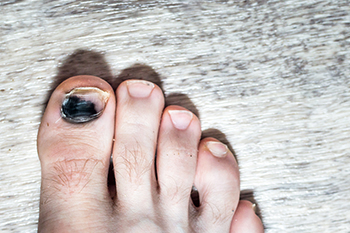
Critical limb ischemia, or CLI, is a serious condition caused by poor blood flow, often due to diabetes or hardened arteries. It leads to severe pain, wounds that will not heal, and even dead tissue. If left untreated, one might need to have their toe amputated, and many others may not survive within a year. CLI can also be linked to black toe, as both conditions result from poor circulation. In severe cases like CLI, lack of blood flow can cause the tissues, including toes, to die, leading to blackening. Treatment aims to restore blood flow to the toe through surgery or other procedures. If that is not possible, treatments like oxygen therapy or special compression can help relieve symptoms. Without any treatment, the affected area, including the black toe, may dry up and worsen. If you have a painful black or discolored toe, it is strongly suggested that you promptly schedule an appointment with a podiatrist for appropriate treatment.
Toe pain can disrupt your daily activities. If you have any concerns, contact Dr. Stephan J. LaPointe of Georgia Foot & Ankle Specialists . Our doctor can provide the care you need to keep you pain-free and on your feet.
What Causes Toe Pain?
Most severe toe pain is caused due to a sports injury, trauma from dropping something heavy on the toe, or bumping into something rigid. Other problems can develop over time for various reasons.
Toe pain can be caused by one or more ailments. The most common include:
When to See a Podiatrist
Diagnosis
In many cases the cause of toe pain is obvious, but in others, a podiatrist may want to use more advanced methods to determine the problem. These can range from simple visual inspections and sensation tests to X-rays and MRI scans. Prior medical history, family medical history, and any recent physical traumatic events will all be taken into consideration for a proper diagnosis.
Treatment
Treatments for toe pain and injuries vary and may include shoe inserts, padding, taping, medicines, injections, and in some cases, surgery. If you believe that you have broken a toe, please see a podiatrist as soon as possible.
If you have any questions please feel free to contact our office located in Rome, GA . We offer the newest diagnostic tools and technology to treat your foot and ankle needs.
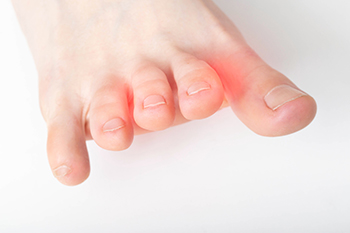
Morton's neuroma is a painful condition that affects the ball of the foot, and the pain is felt typically between the third and fourth toes. It occurs when the tissue surrounding one of the nerves leading to the toes thickens, causing sharp, burning pain or a sensation of walking on a pebble. Numbness or tingling in the toes may also be present. Morton’s neuroma is often caused by irritation or compression of the nerve, usually due to wearing tight shoes, high heels, or engaging in repetitive activities like running. Foot abnormalities, such as flat feet or high arches, can also contribute. To manage symptoms, switching to shoes with a wider toe box and low heels, and using orthotics can reduce pressure on the nerve. A podiatrist may recommend treatments such as corticosteroid injections and anti-inflammatory medications. In severe cases, surgical removal of the neuroma may be necessary. If you have a painful Morton’s neuroma, it is suggested that you schedule an appointment with a podiatrist.
Morton’s neuroma is a very uncomfortable condition to live with. If you think you have Morton’s neuroma, contact Dr. Stephan J. LaPointe of Georgia Foot & Ankle Specialists . Our doctor will attend to all of your foot care needs and answer any of your related questions.
Morton’s Neuroma
Morton's neuroma is a painful foot condition that commonly affects the areas between the second and third or third and fourth toe, although other areas of the foot are also susceptible. Morton’s neuroma is caused by an inflamed nerve in the foot that is being squeezed and aggravated by surrounding bones.
What Increases the Chances of Having Morton’s Neuroma?
Morton’s neuroma is a very treatable condition. Orthotics and shoe inserts can often be used to alleviate the pain on the forefront of the feet. In more severe cases, corticosteroids can also be prescribed. In order to figure out the best treatment for your neuroma, it’s recommended to seek the care of a podiatrist who can diagnose your condition and provide different treatment options.
If you have any questions, please feel free to contact our office located in Rome, GA . We offer the newest diagnostic and treatment technologies for all your foot care needs.
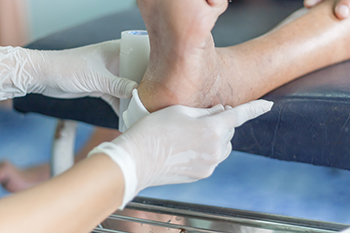
Managing cuts on the bottom of the feet, which requires prompt and careful attention to prevent infection and promote healing, is often done by a podiatrist. This type of doctor will start by cleaning the wound thoroughly with mild soap and water to remove any debris and reduce the risk of infection. This is generally followed by gently patting the area dry with a clean cloth or gauze. The doctor will then apply an antiseptic to the cut to further disinfect the area, and cover the wound with a sterile adhesive bandage or dressing to protect it from dirt and friction. The dressing will be secure but not too tight, allowing for comfort and breathability. Regularly changing the dressing and monitoring the cut for signs of infection, such as increased redness, swelling, or discharge will be recommended. If you have a cut on the bottom of your foot, it is suggested that you schedule an appointment with a podiatrist who can offer you effective treatment.
Wound care is an important part in dealing with diabetes. If you have diabetes and a foot wound or would like more information about wound care for diabetics, consult with Dr. Stephan J. LaPointe from Georgia Foot & Ankle Specialists . Our doctor will assess your condition and provide you with quality foot and ankle treatment.
What Is Wound Care?
Wound care is the practice of taking proper care of a wound. This can range from the smallest to the largest of wounds. While everyone can benefit from proper wound care, it is much more important for diabetics. Diabetics often suffer from poor blood circulation which causes wounds to heal much slower than they would in a non-diabetic.
What Is the Importance of Wound Care?
While it may not seem apparent with small ulcers on the foot, for diabetics, any size ulcer can become infected. Diabetics often also suffer from neuropathy, or nerve loss. This means they might not even feel when they have an ulcer on their foot. If the wound becomes severely infected, amputation may be necessary. Therefore, it is of the upmost importance to properly care for any and all foot wounds.
How to Care for Wounds
The best way to care for foot wounds is to prevent them. For diabetics, this means daily inspections of the feet for any signs of abnormalities or ulcers. It is also recommended to see a podiatrist several times a year for a foot inspection. If you do have an ulcer, run the wound under water to clear dirt from the wound; then apply antibiotic ointment to the wound and cover with a bandage. Bandages should be changed daily and keeping pressure off the wound is smart. It is advised to see a podiatrist, who can keep an eye on it.
If you have any questions, please feel free to contact our office located in Rome, GA . We offer the newest diagnostic and treatment technologies for all your foot care needs.
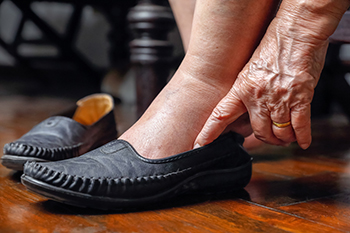
As we age, feet change shape, often becoming wider or flatter due to the loss of fat padding and muscle tone. It is important to ensure shoes provide both comfort and support, fitting snugly without being too wide or narrow. Poorly fitted shoes can worsen issues like osteoarthritis, diabetic nerve damage, hammertoes, bunions, and calluses. Shoes with rubber soles and treads offer the best traction on most surfaces, reducing the risk of falls. Different shoes should be worn for different activities. Supportive walking shoes, for instance, differ from athletic shoes. When shopping for shoes, measure your feet and shop later in the day, when feet are naturally swollen. Shoes should feel immediately comfortable, requiring no breaking in. Proper fit and support can help alleviate foot pain and improve overall mobility, making it important to regularly assess your footwear needs. If you have foot or ankle discomfort, it is suggested that you schedule an appointment with a podiatrist who can offer a proper diagnosis, treatment, and additional pointers on choosing well-fitting footwear.
Getting the right shoe size is an important part of proper foot health. Seek the assistance of Dr. Stephan J. LaPointe from Georgia Foot & Ankle Specialists . Our doctor will provide the care you need to keep you pain-free and on your feet.
Getting the Right Shoe Size
There are many people who wear shoes that are the incorrect size, negatively affecting their feet and posture. Selecting the right shoes is not a difficult process, so long as you keep several things in mind when it comes to choosing the right pair.
As our feet hold our body weight and keep us moving, it is important to treat them right. Picking the right pair of shoes can provide your feet comfort and mobility without pain.
If you have any questions, please feel free to contact our office located in Rome, GA . We offer the newest diagnostic and treatment technologies for all your foot care needs.

Plantar fasciitis is a common cause of foot pain, particularly affecting the heel and arch. It arises from inflammation of the plantar fascia, a thick band of tissue that runs along the bottom of your foot. Symptoms typically include a sharp, stabbing pain, especially noticeable with your first steps in the morning or after sitting for long periods. Repetitive motion from running or step aerobics or added pressure from weight gain can damage or tear the plantar fascia, causing inflammation and pain. To alleviate this discomfort, incorporating specific stretches can be highly effective. Try calf stretches by leaning against a wall with one leg extended behind you, and perform toe stretches by pulling your toes toward you while seated. If pain persists, it is suggested you make an appointment with a podiatrist to get a proper diagnosis and treatment plan.
Plantar fasciitis can be very painful and inconvenient. If you are experiencing heel pain or symptoms of plantar fasciitis, contact Dr. Stephan J. LaPointe from Georgia Foot & Ankle Specialists . Our doctor can provide the care you need to keep you pain-free and on your feet.
What Is Plantar Fasciitis?
Plantar fasciitis is the inflammation of the thick band of tissue that runs along the bottom of your foot, known as the plantar fascia, and causes mild to severe heel pain.
What Causes Plantar Fasciitis?
How Can It Be Treated?
While very treatable, plantar fasciitis is definitely not something that should be ignored. Especially in severe cases, speaking to your doctor right away is highly recommended to avoid complications and severe heel pain. Your podiatrist can work with you to provide the appropriate treatment options tailored to your condition.
If you have any questions please feel free to contact our office located in Rome, GA . We offer the newest diagnostic and treatment technologies for all your foot and ankle needs.
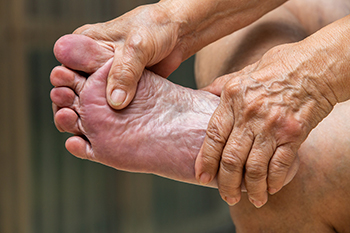
Elderly foot care is essential for maintaining mobility and preventing complications as people age. Older adults often face issues, such as reduced circulation, weakened muscles, and diminished sensation. These can lead to problems like bunions, hammertoes, and painful calluses. Additionally, diabetes can worsen foot issues, increasing the risk of ulcers, infections, and falls. Proper foot care includes regular inspection for cuts, sores, or changes in skin color, as well as maintaining good hygiene and nail care. Wearing supportive, well-fitting shoes can help prevent pressure sores and provide stability. Regular foot exercises and maintaining a healthy weight can also alleviate discomfort and enhance mobility. To address foot problems effectively and prevent serious complications, it’s suggested you make an appointment with a podiatrist. Their expertise in elderly foot care ensures a comprehensive approach to keeping your feet healthy and functional.
Proper foot care is something many older adults forget to consider. If you have any concerns about your feet and ankles, contact Dr. Stephan J. LaPointe from Georgia Foot & Ankle Specialists . Our doctor can provide the care you need to keep you pain-free and on your feet.
The Elderly and Their Feet
As we age we start to notice many changes in our body, but the elder population may not notice them right away. Medical conditions may prevent the elderly to take notice of their foot health right away. Poor vision is a lead contributor to not taking action for the elderly.
Common Conditions
Susceptible Infections
Diabetes and poor circulation can cause general loss of sensitivity over the years, turning a simple cut into a serious issue.
If you have any questions please feel free to contact our office located in Rome, GA . We offer the newest diagnostic and treatment technologies for all your foot and ankle needs.
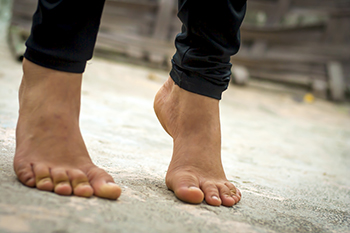
The human foot is a marvel of anatomical engineering, consisting of 26 bones and about 100 ligaments that work in concert to support movement and balance. When taking a step, the foot's complex structure enables a smooth and efficient motion. As the heel strikes the ground, the ligaments and bones absorb and distribute the impact, while the arch provides essential support and flexibility. The toes then push off the ground, aided by a network of ligaments that stabilize the bones and facilitate propulsion. This intricate interplay of bones and ligaments ensures that each step is controlled and cushioned, highlighting the remarkable design of the foot's anatomy in enabling mobility and stability. Many people experience foot pain for various reasons, which may include injuring a part of the foot. If this applies to you, it is suggested that you consult a podiatrist who can determine the cause and offer you effective treatment solutions.
If you have any concerns about your feet, contact Dr. Stephan J. LaPointe from Georgia Foot & Ankle Specialists . Our doctor can provide the care you need to keep you pain-free and on your feet.
Biomechanics in Podiatry
Podiatric biomechanics is a particular sector of specialty podiatry with licensed practitioners who are trained to diagnose and treat conditions affecting the foot, ankle and lower leg. Biomechanics deals with the forces that act against the body, causing an interference with the biological structures. It focuses on the movement of the ankle, the foot and the forces that interact with them.
A History of Biomechanics
Modern technological improvements are based on past theories and therapeutic processes that provide a better understanding of podiatric concepts for biomechanics. Computers can provide accurate information about the forces and patterns of the feet and lower legs.
Understanding biomechanics of the feet can help improve and eliminate pain, stopping further stress to the foot.
If you have any questions please feel free to contact our office located in Rome, GA . We offer the newest diagnostic and treatment technologies for all your foot and ankle needs.